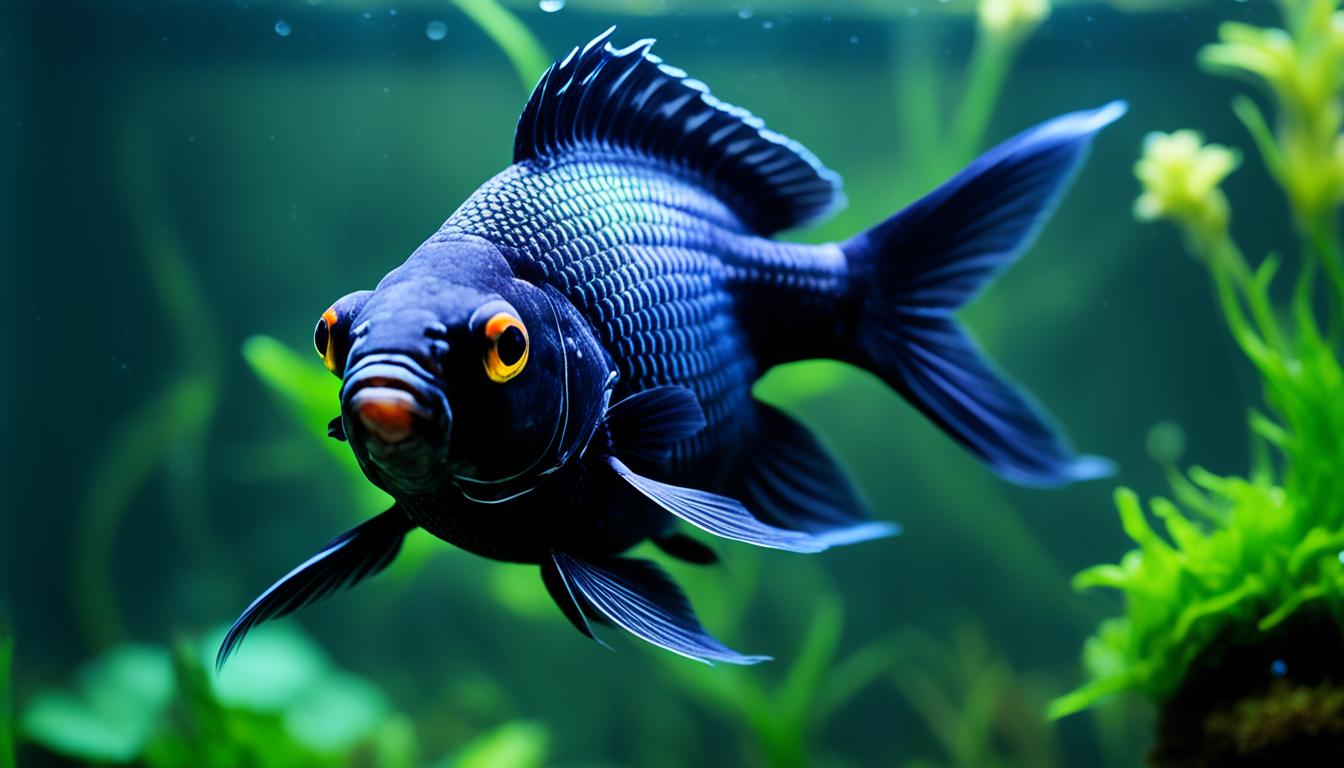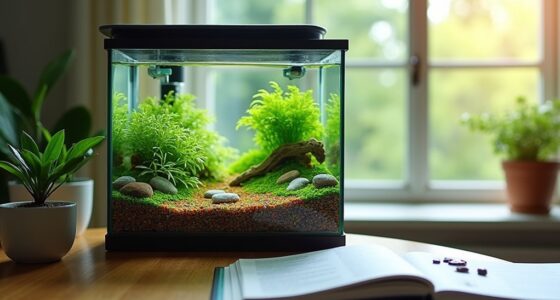To keep your aquarium clean, regularly test water parameters like pH, ammonia, nitrite, and nitrate levels using reliable kits, and adjust as needed. Perform weekly partial water changes of 10-20% to dilute toxins, using a dechlorinator for tap water. Keep algae under control by avoiding overfeeding, cleaning surfaces, and controlling light exposure. Make certain your filter is working well and clean it monthly to support beneficial bacteria. Consistent care helps create a healthy tank environment—continue exploring tips to optimize your aquarium’s health.
Key Takeaways
- Regularly test water parameters like pH, ammonia, nitrite, and nitrate, and adjust as needed to maintain stable water chemistry.
- Perform weekly partial water changes of 10-20%, using dechlorinated tap water to dilute toxins and refresh the environment.
- Clean glass, decorations, and substrate regularly to prevent algae buildup and remove debris that fuels algae growth.
- Use a proper filtration system and clean filter media monthly to support biological balance and clear water.
- Monitor tank conditions daily for signs of algae, cloudiness, or fish stress, and address issues promptly for a healthy aquarium.

Keeping your aquarium clean is essential for your fish’s health and the overall beauty of your tank. A well-maintained environment not only ensures your fish thrive but also keeps algae growth in check. When you focus on proper water quality and regular maintenance, you create a healthy habitat that minimizes stress and disease for your aquatic friends. One of the biggest factors affecting fish health is water quality. You need to regularly test the water parameters—pH, ammonia, nitrite, and nitrate levels—and make adjustments as needed. Using a reliable water testing kit allows you to catch imbalances early, preventing harmful conditions from developing. Performing partial water changes weekly helps dilute toxins and maintain stable water chemistry. When you remove about 10-20% of the water, make sure to treat tap water with a dechlorinator; untreated chlorinated water can harm fish and disrupt beneficial bacteria.
Algae control is another vital aspect of keeping your aquarium clean. Excess nutrients, light, and poor water circulation promote algae growth, which can quickly overrun your tank and threaten your fish’s well-being. To combat algae, avoid overfeeding your fish—uneaten food decomposes and supplies nutrients for algae. Regularly siphon the substrate during water changes to remove debris and detritus that algae feed on. It’s also essential to clean your aquarium glass and decorations with a soft sponge or algae scraper to prevent buildup. Controlling lighting is equally important; keep the lights on for about 8-10 hours daily and consider using a timer to avoid excessive light exposure. If algae persist, you might introduce algae-eating fish or invertebrates, but always research their compatibility with your tank’s inhabitants first.
Filtration plays a crucial role in maintaining both water quality and algae control. A good filter not only removes physical debris but also helps maintain beneficial bacteria that convert harmful waste into less toxic substances. Clean your filter media regularly—at least once a month—without removing all bacteria, so your biological filtration remains intact. By doing this, you guarantee your tank remains clear and balanced. Remember, consistency is key. Daily observation allows you to spot issues early, whether it’s cloudy water, algae blooms, or fish showing signs of stress. With regular checkups, you can address small problems before they escalate, keeping your aquarium a clean, healthy environment where your fish can flourish.
Frequently Asked Questions
How Often Should I Test My Aquarium’s Water Parameters?
You should test your aquarium water parameters at least once a week to guarantee ideal water quality. Regular aquarium testing helps you catch any issues early, like pH imbalances or ammonia spikes. If you notice changes in fish behavior or new additions, test more often. Consistent monitoring keeps your aquatic environment healthy, prevents problems, and makes maintenance easier, so your fish thrive in a stable, clean habitat.
Can Over-Cleaning Harm My Aquatic Life?
Imagine your aquarium teeming with life, delicate and vibrant. Over-cleaning can disrupt this fragile balance, leading to over cleaning consequences like removing beneficial microbes essential for a healthy environment. When you scrub too often, you risk harming your aquatic friends by upsetting their microbial balance, leaving them vulnerable to stress and disease. To protect your ecosystem, clean wisely—balance is key to keeping your aquatic world thriving.
What Are Natural Ways to Maintain Water Clarity?
To maintain water clarity naturally, focus on biological filtration and live plants. Biological filtration uses beneficial bacteria to break down waste, keeping water clear. Live plants absorb excess nutrients and toxins, which helps prevent algae growth and improves water quality. Make sure to add plenty of healthy plants and avoid overfeeding, which can overload your biological filter. Regularly monitor water parameters to keep everything balanced and your aquarium crystal clear.
How Do I Choose the Best Filtration System?
They say, “You get what you pay for,” so choosing the right filter system is essential. First, consider your tank size and fish load to determine the appropriate flow rate. Look for a filter with versatile filter media options to address biological, mechanical, and chemical filtration needs. A good filtration system should match your aquarium’s demands, ensuring clear water and healthy fish.
What Are Signs of Water Quality Issues in My Tank?
You notice algae overgrowth or your fish start acting strangely, like darting or hiding more than usual, indicating water quality issues. Poor water conditions often lead to increased algae and stress for your fish, causing behavior changes. Keep an eye on cloudy water, foul odors, or excessive algae, as these signs suggest you need to check your filtration and perform water changes to restore a healthy environment.
Conclusion
Keeping your aquarium clean might seem like a chore, but it’s worth it for a healthy, beautiful tank. Regular maintenance prevents algae buildup and keeps your fish happy. You might worry it’s too time-consuming, but even quick weekly checks make a big difference. Just stay consistent, and you’ll enjoy a sparkling, thriving aquarium without the hassle. With a little effort, you can create a vibrant aquatic world you’re proud of—no stress required.










